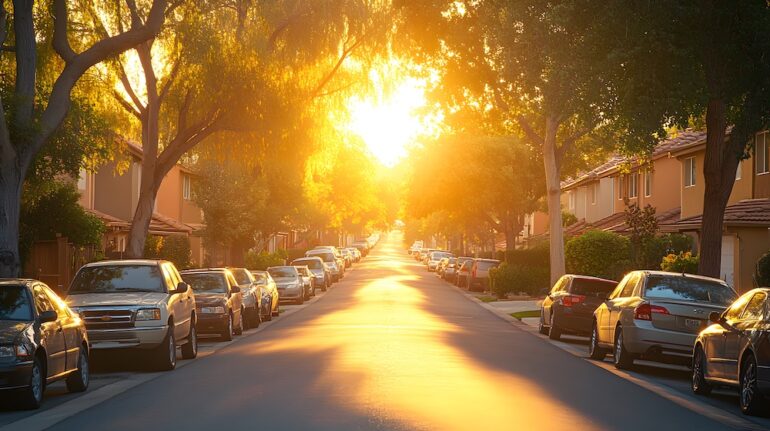Every neighborhood has dilemmas at some point, and street parking is one of the most common. A household with multiple cars may not have sufficient space in the garage or driveway, resulting in vehicles left on the street. If street parking is prohibited, sparks can fly. Is there a solution?
Who makes the rules about street parking?
Traffic and parking rules in subdivisions are typically established by one or two entities: governmental law, as well as the neighborhood homeowners’ association (HOA), if one exists.
The government sets laws on speed limits, stop signs, and school zones. It can also prohibit street parking if the fire marshal designates the sides of the streets as fire lanes, with red striping along each side. Police and sheriffs’ deputies enforce these laws with citations and fines.
Police do not enforce HOA parking rules. If there is an HOA in your neighborhood, a second layer of rules applies. And, you guessed it, the most common HOA traffic rule is a restriction on street parking. Even if there is no fire lane designation, if the HOA covenants and restrictions prohibit street parking, the rules are enforceable through warnings and then penalties applied to the errant homeowner’s dues. Homeowners are responsible for ensuring that guests also park in accordance with the regulations.
HOAs set these restrictions to prevent neighborhood streets from becoming cluttered with parked cars, thereby limiting driving space. Some HOAs even limit the number of vehicles that can be parked in a driveway and may require keeping the garage free of clutter so that cars can be parked inside. Homeowners may find it onerous, but the HOA’s purpose is to safeguard the neighborhood’s appearance and uphold home valuations.
Some HOAs issue parking permit stickers to homeowners and temporary permits to guests. Some neighborhoods also offer guest parking spaces.
Public versus private streets
In any gated neighborhood, the streets are privately owned by the collective homeowners. This means the public cannot drive the streets at will and must have a gate code for entry. Such streets sometimes are narrower than public streets by as much as 5 feet. In such communities, street parking is likely not allowed, as it would further congest the already narrow streets.
What happens if you park on the street where it’s not allowed?
If you park on the street in violation of the municipal code, a police officer may issue you a citation, and your car may be towed. It is a violation of the law to block intersections, driveways, mailboxes, fire hydrants, and crosswalks. If someone parks in a way that blocks any of these, law enforcement may be contacted to address the violation.
Suppose you park illegally in the street and an emergency arises. In that case, a fire truck or other first responder vehicle can lawfully push your car out of the way, if needed, without legal liability for any damages to your vehicle.
If there are no government or HOA restrictions on street parking, someone can park on the street in front of your house without violating any laws.
Over major holidays, when you may have family guests, you can get a temporary waiver if you request it from the HOA in advance. Alternatively, the HOA board may permit you to temporarily exceed driveway limitations, but not street parking restrictions.
Related – Knowing the Difference Between Public and Private Streets


